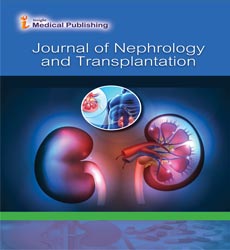Brief Note on Kidney Diseases in Children
Michel Dashbazar*
Department of Medicine, University of Kashihara, Sousse, Tunisia
- *Corresponding Author:
- Michel Dashbazar
Department of Medicine,
University of Kashihara,
Sousse,
Tunisia
E-mail: Micheldashbazar@gmail.com
Received Date: October 11, 2021; Accepted Date: October 26, 2021; Published Date: October 30, 2021
Citation: Dashbazar M (2021) Brief Note on Kidney Diseases in Children. J Nephrol Transplant Vol.5 No.4:004
Description
Kidney disease can affect children in a variable ways, from treatable conditions with no long-term consequences to lifethreatening conditions. Acute kidney disease develops suddenly; lasts a short time, and can be severe with long-term consequences or disappear completely when the underlying cause is treated. Chronic Kidney Disease (CKD) doesn't go away with treatment and tends to get worse over time. CKD eventually leads to kidney failure, which is described as endstage renal disease or end-stage kidney disease when treated with a kidney transplant or with blood-filtration treatments known as dialysis.
Kidney failure, also known as renal failure, occurs when the kidneys slow down or stop properly filtering waste products out of the body, which can cause waste and toxic substances to build up in the blood. Kidney failure can be acute (sudden) or chronic (occurs over time and is often long-lasting or permanent).
Causes of Kidney Diseases in Children
Kidney diseases in children can be affected by
• Birth defects
• Hereditary diseases
• Posterior urethral stenosis
• Fetal hydronephrosis
• Polycystic Kidney Disease (PKD)
From birth to 4 years old, birth defects and genetic diseases are the main causes of kidney failure. Between the ages of 5 and 14, kidney failure is most commonly caused by genetic diseases, nephrotic syndrome, and systemic diseases. Between the ages of 15 and 19, diseases affecting the glomeruli are the main cause of kidney failure, and hereditary diseases become less common.
Birth defects
A birth defect is a problem that occurs when a baby is developing in the womb. Some birth defects that affect the kidneys include aging kidneys, renal hypoplasia, and ectopic kidneys. These malformations are abnormalities in the size, structure or position of the kidneys:
• Nephropathy: Babies born with only one kidney
• Renal dysplasia: A baby is born with both kidneys, but one doesn't work
• Ectopic kidney: A baby born with a kidney located below, above, or on the opposite side of its normal position.
In general, children with these conditions lead full and healthy lives. However, some children with failing kidneys or renal hypoplasia are at high hazard of developing kidney disease.
Hereditary diseases
Hereditary kidney disease is a genetically transmitted disease from parents to children. An example is Polycystic Kidney Disease (PKD). It is characterized by a large number of grape-like clusters of fluid-filled cysts (abnormal cysts) that expand both kidneys over time. These cysts take over and destroy the functioning kidney tissue. Another hereditary disease is Alport Syndrome. This is caused by mutations in a gene in a protein called collagen that makes up the glomerulus. This condition leads to damaging of the kidneys. Alport syndrome generally develops in early childhood and is more severe in boys than in girls. In addition to kidney disease, this disease can cause hearing and visual impairment.
Posterior urethral stenosis
This narrowing or blockage of the urethra only affects boys. It can be diagnosed before the baby is born or soon after and treated with surgery.
Fetal hydronephrosis
Enlargement of one or both kidneys is caused by a blockage in the developing urinary tract or from a condition called Ureteral Reflux (UR) in which urine flows abnormally back (or reflux) from the bladder to the ureter. Fetal hydronephrosis is often diagnosed before the child is born, and treatments vary widely. In some cases, the condition only requires ongoing monitoring; in others, surgery must be done to clear the blockage of the urinary tract.
Polycystic kidney disease
This is a disease in which many fluid-filled cysts develop in both kidneys. Tumors can increase that they lead to kidney failure. Most forms of PKD are inherited. Doctors can diagnose it before or after the baby is born. In some cases, there are no symptoms; in others, PKD can lead to urinary tract infections, kidney stones, and high blood pressure. Treatment of PKD varies some cases can be managed by dietary changes; others require a kidney transplant or dialysis.
Open Access Journals
- Aquaculture & Veterinary Science
- Chemistry & Chemical Sciences
- Clinical Sciences
- Engineering
- General Science
- Genetics & Molecular Biology
- Health Care & Nursing
- Immunology & Microbiology
- Materials Science
- Mathematics & Physics
- Medical Sciences
- Neurology & Psychiatry
- Oncology & Cancer Science
- Pharmaceutical Sciences
